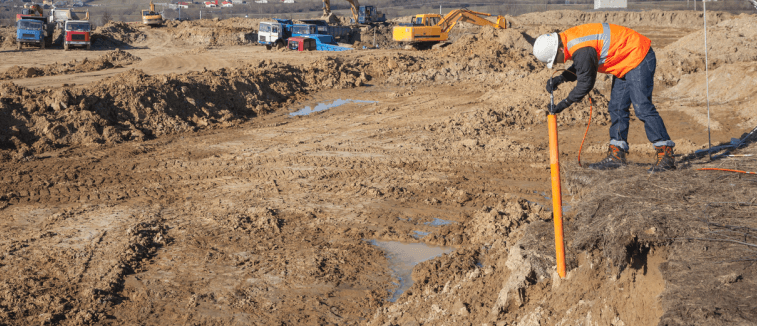The 6-Second Trick For Geotheta
The 6-Second Trick For Geotheta
Blog Article
How Geotheta can Save You Time, Stress, and Money.
Table of ContentsThe Main Principles Of Geotheta 9 Simple Techniques For GeothetaAn Unbiased View of GeothetaNot known Facts About GeothetaThe smart Trick of Geotheta That Nobody is Talking About

They carry out site examinations, accumulate samples, execute research laboratory examinations, and assess data to assess the viability of the ground for building and construction jobs - Geo Tech Engineer. Based upon their searchings for, geotechnical designers supply referrals for structure layout, incline security, keeping frameworks, and reduction of geotechnical hazards. They collaborate with other experts, such as engineers, architectural engineers, and construction teams, to make sure that geotechnical factors to consider are incorporated into the total project style and application
By analyzing the habits and homes of dirt and rock, they can recognize possible geotechnical threats such as landslides, dirt negotiation, or slope instability. Their expertise helps prevent failings or mishaps that could threaten lives and property. Right here are some comprehensive responsibilities and responsibilities of a geotechnical designer: Site Investigation: Geotechnical designers conduct site investigations to gather data on subsurface problems.
They interpret the information to understand the residential properties and actions of the dirt and rock, including their toughness, permeability, compaction characteristics, and groundwater problems. Geotechnical Analysis and Design: Geotechnical designers analyze the information gathered during site investigations to evaluate the security and viability of the website for building jobs. They do geotechnical computations and modeling to examine factors such as bearing capability, settlement, incline security, lateral earth stress, and groundwater circulation.
The Basic Principles Of Geotheta
Foundation Layout: Geotechnical engineers play an important role in making foundations that can securely support the intended structure. They analyze the soil problems and load needs to identify the appropriate structure type, such as shallow structures (e.g., grounds), deep foundations (e.g (https://www.startus.cc/company/geotheta)., heaps), or specialized techniques like soil enhancement. They take into consideration variables such as negotiation limits, bearing capability, and soil-structure communication to create optimum structure styles
They evaluate building and construction plans, monitor website activities, and conduct area evaluations to validate that the style recommendations are adhered to. If unanticipated geotechnical issues arise, they analyze the circumstance and supply suggestions for remediation or modifications to the layout. Threat Assessment and Mitigation: Geotechnical engineers examine geotechnical threats and threats related to the project website, such as landslides, liquefaction, or soil disintegration.

Partnership and Communication: Geotechnical engineers function very closely with various other professionals associated with a task, such as engineers, structural designers, and building and construction groups. Efficient communication and collaboration are vital to incorporate geotechnical considerations into the overall task style and building and construction procedure. Geotechnical engineers give technical knowledge, solution queries, and make sure that geotechnical requirements are satisfied.
Top Guidelines Of Geotheta
Here are some sorts of geotechnical engineers: Foundation Designer: Foundation engineers concentrate on designing and evaluating foundations for frameworks. They assess the soil conditions, load requirements, and site features to establish one of the most appropriate foundation kind and design, such as shallow foundations, deep foundations, or specialized techniques like pile foundations.
They review the factors affecting incline stability, such as soil homes, groundwater conditions, and incline geometry, and create techniques to stop slope failures and mitigate threats. Quake Designer: Quake engineers focus on analyzing and developing structures to endure seismic forces. They assess the seismic hazard of a site, assess soil liquefaction potential, and develop seismic style requirements to make certain the safety and durability of structures throughout quakes.
They do area screening, collect samples, and assess the gathered data to characterize the soil residential or commercial properties, geologic developments, and groundwater conditions at a site. Geotechnical Instrumentation Engineer: Geotechnical instrumentation designers concentrate on monitoring and gauging the habits of dirt, rock, and frameworks. They install and keep instrumentation systems that keep track of elements such as dirt negotiation, my review here groundwater levels, incline activities, and structural variations to examine performance and supply very early warnings of possible issues.
The Ultimate Guide To Geotheta
They perform examinations such as triaxial tests, consolidation tests, straight shear tests, and permeability tests to gather data for geotechnical analysis and style. Geosynthetics Engineer: Geosynthetics engineers concentrate on the layout and application of geosynthetic materials, such as geotextiles, geogrids, and geomembranes. They utilize these products to enhance dirt security, reinforce inclines, provide drainage services, and control erosion.
They tend to be investigative people, which suggests they're intellectual, reflective, and investigative. They are interested, methodical, logical, analytical, and sensible. Some of them are likewise social, implying they're kind, generous, participating, individual, caring, practical, compassionate, tactful, and pleasant - Engineer of Record.
In the workplace atmosphere, geotechnical engineers utilize specialized software devices to do calculations, produce styles, and evaluate information. They prepare records, review task specs, communicate with customers and team participants, and coordinate job activities. The workplace setting provides a helpful atmosphere for study, evaluation, and cooperation with other professionals entailed in the project.
See This Report about Geotheta
They regularly visit job websites to perform site investigations, analyze geotechnical problems, and collect data for analysis. These sees involve traveling to different places, occasionally in remote or challenging terrains. Geotechnical engineers might execute soil sampling, conduct tests, and display construction activities to make sure that the geotechnical facets of the task are being executed properly.
Geotechnical designers also function in specialized geotechnical research laboratories. Geotechnical research laboratory designers function extensively in these environments, taking care of screening devices, operating instruments, and recording information.
Report this page